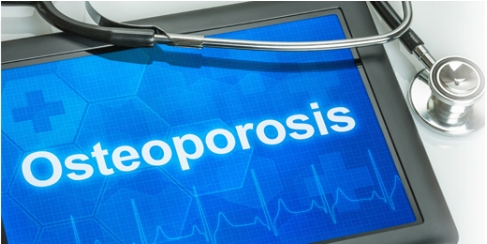Osteoporosis: What You Need to Know

Staying active is key to living a healthy life as you age. Unfortunately, osteoporosis is a common disease that can lead to serious injuries and compromise your mobility. Osteoporosis affects both men and women and causes your bones to become weak and fragile. As you lose bone mass, you’re more likely to break a bone. Even a bump or fall can cause a fracture.
The inside of a normal bone looks like a honeycomb. When you have osteoporosis, the holes and spaces in the honeycomb become much bigger. The outside of your bone also becomes thinner, which weakens your bones even more.
What Causes Osteoporosis?
Many different risk factors can lead to osteoporosis. They include:
- Your gender—women are more likely to develop osteoporosis than men.
- Your age—your risk increases as you get older.
- Your family history—if you have a family member with osteoporosis you may be at risk, too.
- Sex hormones—the drop in estrogen that occurs with menopause can lead to osteoporosis; low testosterone levels can cause osteoporosis in men.
- Your diet—low levels of calcium and vitamin D can lead to bone loss.
- Inactivity—lack of physical activity or bed rest can weaken your bones.
- Smoking—cigarettes are harmful for your bones.
- Alcohol—drinking too much alcohol can result in bone loss and broken bones.
- Medicines—certain medicines used to treat other conditions can cause bone loss.
- Medical conditions—many different diseases can impact your bone health.
What Are the Symptoms of Osteoporosis?
There are no warning signs that you have osteoporosis. You can’t see or feel bone loss. You may not know that you have it until you break a bone.
Is there a Screening for Osteoporosis?
A bone mineral density test is most often used to diagnose osteoporosis. The screening uses a technique called central dual-energy X-ray absorptiometry or central DXA. It measures your bone density at your hip and spine. The results show whether you have osteoporosis and your risk of breaking a bone.
Women older than age 65 should be screened for osteoporosis with a bone density test. If you’re a woman younger than age 65 and have a high risk for fractures, discuss with your doctor when you should begin screenings for osteoporosis. There are no standard screening recommendations for men. Discuss with your doctor if you may be at risk for osteoporosis and whether you should get screened.
How Can I Reduce My Risk for Osteoporosis and Fractures?
Whether you have osteoporosis or are at risk of developing it, many of the steps you can take to treat and prevent bone loss are the same. They often include lifestyle changes and medication, if needed. Some lifestyle changes that can help protect your bones are:
- Eating a healthy diet that’s high in calcium and vitamin D with foods such as low-fat milk, yogurt, cheese, and foods fortified with calcium like orange juice and cereal
- Increasing your physical activity—aim for about 30 minutes of moderate-intensity physical activity, such as brisk walking, most days of the week
- Quitting smoking and limiting your alcohol intake
If your doctor recommends medicine for treating your osteoporosis, there are several different options available. Many of these medicines target either cells or hormones involved in bone loss. All medication has side effects. Work with your doctor to weigh the risks and benefits to find the one that may be best for you.
If you have osteoporosis, it’s also important to take steps to prevent falls that can lead to broken bones. Some ways to prevent falls are:
- Wearing nonslip shoes
- Keeping clutter off of your floors
- Making sure your home is well-lit
- Securing carpets and area rugs to the floor
- Using a rubber mat in the shower or bath tub
- Installing grab bars in your bathroom
If you have questions or concerns about your bone health, discuss them with your doctor. You can take steps to help keep your skeleton strong for many years to come.
© 2000-2018 The StayWell Company, LLC. 800 Township Line Road, Yardley, PA 19067. All rights reserved. This information is not intended as a substitute for professional medical care. Always follow your healthcare professional’s instructions.
